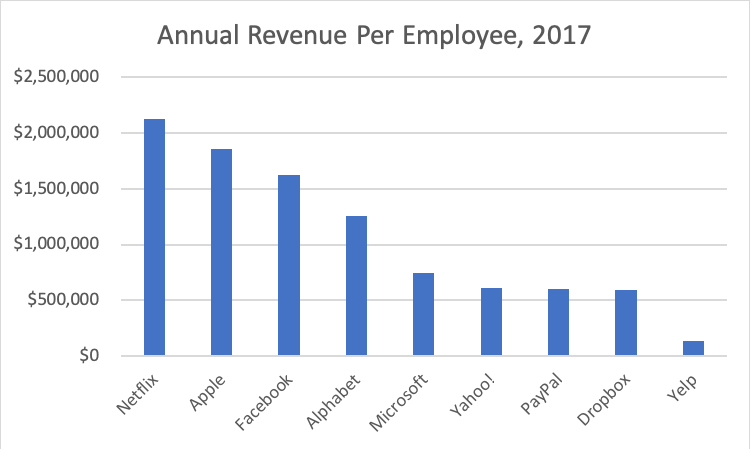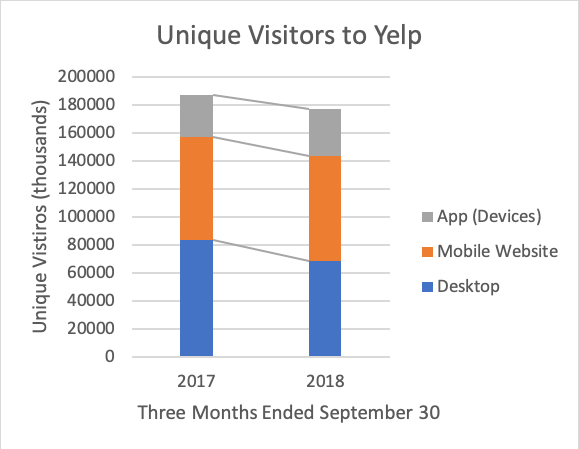Can Yelp use AI to Disrupt its Business Model?

Can Yelp use AI to Disrupt its Business Model?
Yelp is a leading online review platform that connects consumers to local businesses, with over 100 million recommended reviews. Revenue is generated primarily from the sale of advertising on the Yelp website and mobile apps to local businesses, followed by transactions.
Artificial Intelligence (AI): A Solution for Productivity Woes?
Despite successfully carving out a profitable niche in the consumer technology space, Yelp has one of the lowest revenues per employee among publicly traded tech companies [1,4]. With a high-touch sales force, Yelp has struggled to scale its advertising revenue as productively as its peers. Sales representatives account for about 65% of its workforce, compared to less than 30% for Alphabet [2]. In 2017, Yelp revenue per employee was less than $150,000 [3], compared to over $1M for Netflix, Apple, Facebook, and Alphabet [1]. AI represents a significant opportunity for Yelp to scale beyond high-intensity sales.

Yelp has lowest revenue per employee among tech firms
Industry-wide, technology companies have invested in AI to increase customer lifetime values and retention. Netflix’s search and recommendation algorithms powered by AI is estimated to save the company over $1B annually in recovered subscription cancellations [5]. While total US digital ad spend grew over 20% in 2017, Yelp barely registers in spending market share, despite being a top media property [6]. Yelp’s low margins and low revenue scalability have been linked to high account churn, representing a significant area for improvement [7]. Furthermore, headwinds from stagnant to negative visitor growth [8] has created a need for highly personalized content and recommendations to reinvigorate user engagement. Spotify saw daily engagement increase 20% and long-tail “artists listened to” improve 65% with the launch of AI-powered personalization features such as “New Releases for You” [9].

Yelp has seen decline in year over year traffic
Incremental Improvements and Building Engagement Moat
Historically, Yelp has taken a fragmented approach towards artificial intelligence but made strides in adoption as recently as this year. In 2015, the Search and Relevance team launched features to classify user-generated photos, helping users make faster decisions on where to dine based on food, interior, exterior and menu photos [10]. In 2017, nearly two years later, incremental changes in photo classification quality was launched [11]. In 2018, more teams started adopting machine learning into their respective contexts: from new ad products for businesses [12], to better search and browse experiences for consumers [13]. By July 2018, Yelp officially launched artificial intelligence tools for its sales teams to streamline the sales process, cross sell ad products, and optimize ads for businesses [14].
Yelp is still in the nascent years of scaling out new products and business lines, with revenue from non-ad products at less than 10% of overall revenue [3]. These new products will prove crucial to the gathering of both greater volumes and increased frequency of data to serve more relevant content, recommendations, and services to customers and businesses alike [6]. One year after the Grubhub partnership was announced, “popular dishes” powered by machine learning launched to help consumers solve decision fatigue [15]. One year after the Nowait acquisition [16], Yelp launched waitlist kiosks and the ability to join a waitlist remotely, saving consumers time and providing new insights to restaurant owners, allowing restauranteurs to open up more seating and drive greater revenue [17].
Siri, Yelp Me the Future
To continually ship AI-powered products that are truly compelling, data and talent reign king. New mediums of engagement are needed to widen the data funnel and increase frequency of data acquisition to foster new product development [18]. In addition to deepening its engagement moat, Yelp could consider investments into industries adjacent to its local business core competencies: for instance, mapping/navigation and deeper integration with IoT devices (specifically, autos and voice) where consumers are spending increasing share of online time.
Organizationally, Yelp should make AI a strategic priority and build team capabilities across business development, product, engineering, operations, and sales to execute AI-driven features faster. Attracting and retaining talent remain key [19], as evidenced by Yelp’s own “AI winter” from 2016-2017 when significant talent left for rival companies. To build new revenue, Yelp needs to change its mindset from “AI for operational improvement” to “AI for new products” that connect more deeply to consumers and businesses than ever before [5]. Google’s approach to AI as a way to “save users time” [20] can be helpful in thinking about how to create a deeper moat around increased user engagement. By being the most efficient way to achieve a task or to research information, Google is betting they can remain the default choice for consumers.
In the face of well-capitalized competitors that have had a near monopoly on data and talent, is Yelp too late to the AI game? Where and how can Yelp outmaneuver industry heavyweights like Google, Facebook, and Amazon?
(800 words)
Sources:
[1] Jeff Desjardins, “Top 20 Tech Companies by Revenue Per Employee”, Visual Capitalist, August 23, 2017, http://www.visualcapitalist.com/top-20-tech-companies-revenue-per-employee/, accessed November 2018.
[2] “Number of full-time Alphabet employees from 2008 to 2016, by department”, Statista, February 2017, https://www-statista-com.ezp-prod1.hul.harvard.edu/statistics/219333/number-of-google-employees-by-department/, accessed November 2018.
[3] Yelp Annual Report 2017,
http://www.yelp-ir.com/static-files/90e265a5-2077-4879-8cdd-6810a892b391, accessed November 2018.
[4] Dropbox Quarterly Report, March 2018,
https://dropbox.gcs-web.com/static-files/b51002ef-aca2-4956-a4f9-fa10fd656d58, accessed November 2018.
[5] Jacque Bughin, Eric Hazan, Sree Ramaswamy, Michael Chui, Tera Allas, Peter Dahstrom, Nicolaus Henke, and Monica Trench, “Artificial Intelligence: The Next Digital Frontier?”, McKinsey Global Institute Discussion Paper June 2017, https://www.mckinsey.com/~/media/McKinsey/Industries/Advanced%20Electronics/Our%20Insights/How%20artificial%20intelligence%20can%20deliver%20real%20value%20to%20companies/MGI-Artificial-Intelligence-Discussion-paper.ashx, accessed November 2018.
[6] “Data Suggests Surprising Shift: Duopoly Not All-Powerful”, eMarketer March 2018, https://www.emarketer.com/content/google-and-facebook-s-digital-dominance-fading-as-rivals-share-grows, accessed November 2018
[7] David Marino-Nachison, “Yelp: A ‘Grain of Salt’ for Its Investment Plans”, February 2018, https://www.barrons.com/articles/yelp-a-grain-of-salt-for-its-investment-plans-1518102162?mod=article_inline, accessed November 2018.
[8] Yelp Quarterly Report Q3 2018, http://www.yelp-ir.com/static-files/5e46dfa3-0f51-4c29-9f53-6c7b69df9a97, accessed November 2018.
[9] Mary Meeker. “Internet Trends Report 2018”, Kleiner Perkins, May 2018, https://www.kleinerperkins.com/perspectives/internet-trends-report-2018, accessed November 2018.
[10] Wei-hong C, “How We Use Deep Learning to Classify Business Photos at Yelp”, Yelp Engineering Blog, October 2015, https://engineeringblog.yelp.com/2015/10/how-we-use-deep-learning-to-classify-business-photos-at-yelp.html, accessed November 2018.
[11] Alex M, “Finding Beautiful Yelp Photos Using Deep Learning”, Yelp Engineering Blog, November 2016, https://engineeringblog.yelp.com/2016/11/finding-beautiful-yelp-photos-using-deep-learning.html, accessed November 2018.
[12] “Introducing Custom Ads on Yelp”, Yelp Official Blog, March 2018, https://www.yelpblog.com/2018/03/introducing-custom-ads-on-yelp-allowing-businesses-the-ability-to-select-which-photos-and-reviews-are-highlighted-in-their-ads, accessed November 2018.
[13] Kyle Wiggers, “Yelp Collections uses machine learning to serve up recommendations”, Venture Beat May 2018, https://venturebeat.com/2018/05/24/yelp-collections-uses-machine-learning-to-serve-up-recommendations/, accessed November 2018.
[14] “3,000 Yelp sales reps are powered by artificial intelligence”, VentureBeat, July 23, 2018. https://venturebeat.com/2018/07/23/3000-yelp-sales-reps-are-powered-by-artificial-intelligence-vb-live, accessed November 2018.
[15] Rachel Kaser, “Yelp uses machine learning to create Popular Dishes list”, The Next Web, June 2018, https://thenextweb.com/apps/2018/06/19/yelp-uses-machine-learning-to-create-popular-dishes-list/, accessed November 2018.
[16] “Yelp Acquires Leading Restaurant Waitlist Service Nowait”, Business Wire, March 1, 2017, https://www.businesswire.com/news/home/20170301005514/en/Yelp-Acquires-Leading-Restaurant-Waitlist-Service-Nowait , accessed November 2018
[17] “Yelp Adds Kiosks in Restaurants to Disrupt the Waitlist”, Eater, November 1, 2018, https://sf.eater.com/2018/11/1/18040438/yelp-nowait-kiosks-in-restaurants-wait-list, accessed November 2018.
[18] Michael Chui, James Manyika, Mehdi Miremadi, Nicolaus Henke, Rita Chung, and Pieter Nel, “Notes from the AI Frontier: Insights from Hundreds of Use Cases”, McKinsey Global Institute Discussion Paper April 2018. https://www.mckinsey.com/featured-insights/artificial-intelligence/notes-from-the-ai-frontier-applications-and-value-of-deep-learning, accessed November 2018.
[19] Daniel Kupper, Markus Lorenz, Kristian Kuhlmann, Olivier Bouffault, Lim Yew Heng, Jon Van Wyck, Sebastian Kocher, and Jan Schlageter, “AI in the Factory of the Future”, The Boston Consulting Group April 2018, https://www.bcg.com/en-us/publications/2018/artificial-intelligence-factory-future.aspx, accessed November 2018.
[20] Sundar Pichai, “Solving problems with AI for everyone”, Google Blog, May 8, 2018, https://www.blog.google/technology/ai/io18-overview/, accessed November 2018.



Interesting food for thought (pardon the pun)! I agree with your point that data is king in this AI-fueled environment and Yelp needs to find an edge where they can compete against the data and talent advantage many of these large players have. That is why, aside from Google and Facebook, I also worry about players like food delivery, especially integrated platforms (Uber and Uber Eats, Amazon recently launching Amazon Restaurants). The reasoning behind this is several folds. The first is Yelp’s touchpoint during the customer journey – they traditionally help in the selection portion and then the after-sales portion for the reviews. They have tried to expand to the occasion portion of the customer journey (which is more frequent), whether it be in delivery via Eat24 or Waitlists. My concern is that these segments are not a key source of strength yet for them – the food delivery space is very crowded and waitlists necessitates a change in behavior which will take time to develop. Uber and Amazon will have a stronger understanding of who the customers are given data collected from their other products (e.g. Uber will be better at geographic recommendations given commute patterns, Amazon perhaps knows price sensitivity) – the value to the restaurants in this case will be higher. Given these challenges, I find it interesting to see where Yelp decides to best leverage machine learning going forward and if they can carve a niche with a unique data set only they have.
I do agree with you that Yelp has an opportunity to better leverage AI, especially since they have traditionally relied on crowd sourcing of data. As new restaurants open up and with the continued upward trend of travel, Yelp still has a competitive edge to be the go to app. I would have a hard time associating Uber purely as a review or recommendation app. While I do think that Google’s advancement in AI poses a threat to Yelp, especially since Google also controls the search engine, it can differentiate itself by having influencers on its site. For example, if I am able to follow on Yelp the food recommendations of chefs/celebrities I admire, I may be more likely to get on their platform.